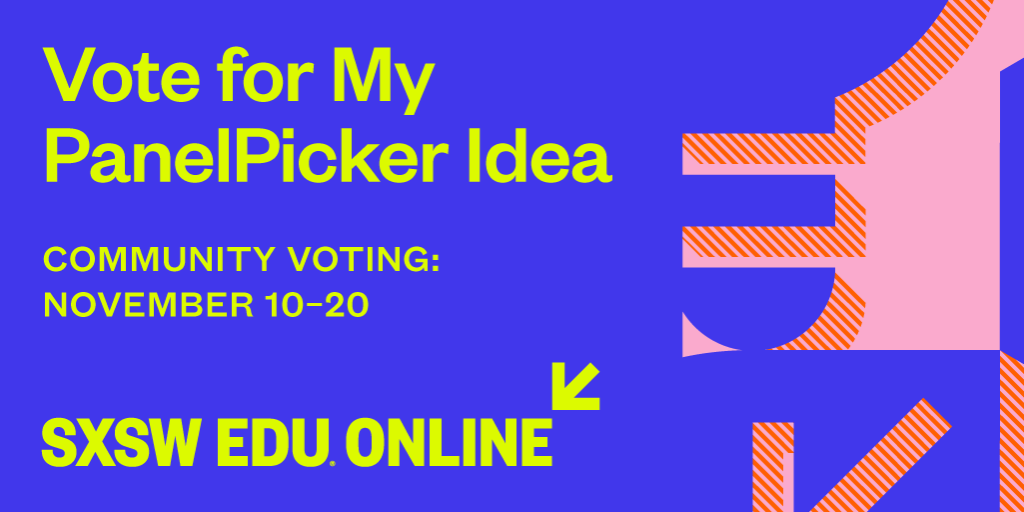
SXSW EDU 2021 PanelPicker
At a Glance
During November 10-20, 2020, vote for the JFF panels you want to see at the SXSW EDU Online conference taking place March 9-11, 2021. PanelPicker is the official SXSW user-generated session proposal platform, designed to let the voting community shape the 2021 SXSW conference.
JFF is excited to be part of several potential SXSW EDU Online sessions with thought-leading partners including Climb Credit, Zollege, Mastercard, JP Morgan Chase, Walmart, and more.
This easy, three-step online process allows the community to have a voice in what creative and thought-provoking programming is scheduled at the SXSW Conference and SXSW EDU.
During November 10-20, 2020, vote for the panels you want to see at the SXSW EDU Online conference, taking place virtually March 9-11, 2021.
Here’s how:
- Create a PanelPicker account (it’s quick, and you only need to do it once).
- Visit the links below to view JFF’s sessions.
- Click “Vote Up” on the left of the page if you’d like to see that session at SXSW EDU Online. Feel free to leave a comment to engage with panelists and the SXSW voting community.
Happy panel-picking! Share your favorite panels on social media using #SXSWEDU and #PanelPicker to encourage more votes.
Getting Back to Work: Investment and Innovation in Training
Learn about the unique impact that investment and innovation can have in making training affordable, accessible, and appropriate to get workers back to work.
Financing the Future of Skill Development
This session will explore the latest innovations and issue a call to action to reimagine the way that education and skills development are financed.
Intermediary Leadership and Designing for Equity
This talk will focus on the critical role intermediaries play in developing equitable college and career pathways. We will highlight strategies that improve systems and outcomes for youth of color and youth experiencing poverty. We will also discuss how intermediaries can motivate systems-level leaders to identify and dismantle inequitable barriers, and the challenges we collectively face to embed equitable values, policies, and practices at the heart, and not just a part, of intermediary work.
A Vision for an Equitable Economic Recovery
This session will explore some of the most bold solutions for the next Presidential Administration and state policymakers to think boldly about the nation’s future and how best to build human capital and scale education and workforce development solutions.
What Today’s Kids Need for Tomorrow’s World
In this book talk, Stephanie Krauss shares what today’s kids really need to prepare for in tomorrow’s world—especially in a volatile America plagued by the twin pandemics of COVID-19 and systemic racism—plus where and how they can get what they need to be ready.
How Career Navigation Tech Scales Social Capital
This talk will explore how career navigation Innovators to Watch bring social capital to scale today, and consider how future innovations could recognize, honor, and activate the resources embedded within diverse social networks outside of education and jobs.
UVA Edge: Innovations in Higher Ed
Learn about UVA Edge, an innovative new online education model tailored to working adults, that will teach skills aligned to employer demand, including digital and human skills through liberal arts courses as well as deeper skills important in the workplace.
Get by with a Little Help from Your… Company?
This session will be a facilitated discussion on how companies can reimagine and rebuild talent practices in a way that emphasizes equity, puts people at the center of business strategy, and creates economic mobility.
CBE at Work: Better Learning for the Discerning
Learn how competency-based education (CBE) can help build a future-ready workforce through employers, who require effective training methods, and for learners, whose chief barrier is time.
Will AI and Tech End Hiring Bias or Reinforce it?
This session will focus on how to ethically and effectively use AI and other emerging technologies to promote more equitable hiring processes. It will also explore how higher education institutions and employers can use technology to support skills-based hiring practices.